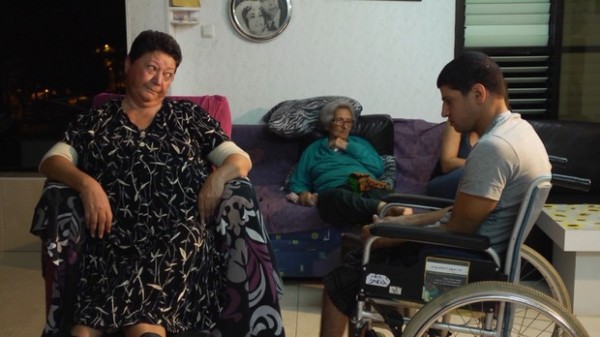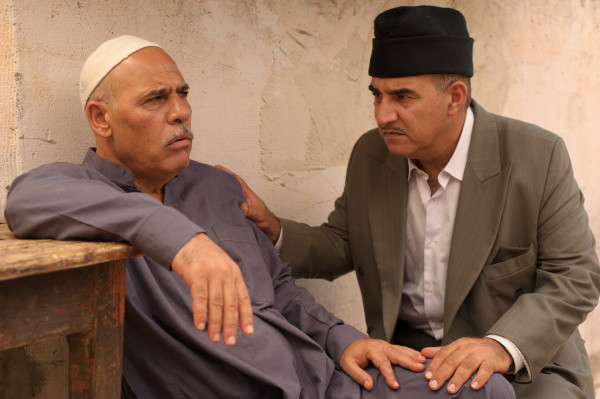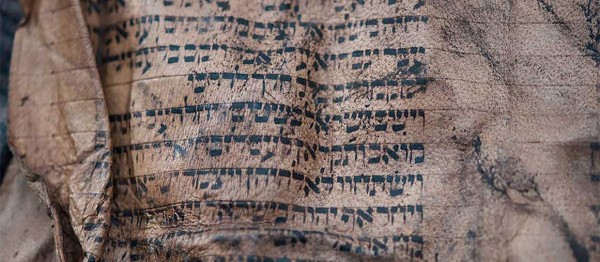The Toronto Jewish Film Festival, one of Toronto’s biggest cultural events, starts its 10-day run on April 30 with an eclectic selection of movies from around the world, including Israel.
A preview:
Are Jewish-style delicatessens a dying breed?
It would seem so, judging by the hard, cold statistics served up in Deli Man, Erik Greenberg Anjou’s affectionate tribute to a Jewish culinary institution.
In 1931, the five boroughs of New York City boasted of 1,55o kosher delis. “There was a deli at every corner,” says David “Ziggy” Gruber, a third-generation deli owner. Today, there are probably no more than 150 to 200 delis in all of the United States.
The deli, a German American creation, has been in decline for a number of reasons — rising food costs, falling profits and changing tastes and demographics. But don’t tell that to Gruber, the proprietor of Kenny & Ziggy’s New York Delicatessen in Houston, Texas. One of several deli men featured in this highly entertaining documentary, he’s a New Yorker of Hungarian and Romanian origin. A portly figure in his mid-30s who performs his job with dedication and gusto, he pops in and out of Deli Man like a tireless promoter.

Apart from Gruber, we’re introduced to American and Canadian practitioners of the trade like Zane Caplansky, Norman Rappaport, Jack Mendelson, Steve Auerbach, Yitz Penciner, Barry Orenstein and Dennis Howard. They work very hard and put up with a finicky clientele, but they love what they’re doing.
“It’s a tough business,” says David Sax, the author of Save the Deli, published a few years ago.
The deli as we know it today came into being in New York City’s Lower East Side in the 1840s. The first deli men were German Christian and German Jewish immigrants. Jews from Eastern Europe and Romania adopted the tradition. By the 1920s, delis had acquired a certain cachet and were particularly popular with Jewish entertainers.
Delis dished out Jewish soul food like smoked meat, pastrami and tongue sandwiches, chicken and barley soup, cabbage rolls, kreplach, chopped liver, cole slaw and pickles. The food, though fatty, was never less than flavourful and filling.
Gruber, a talkative and charming fellow who was close to his grandfather, went into the business because he felt most at home in the hustle and bustle of a deli. “I wanted to perpetuate the deli,” he says. “This was my calling.”
The film observes Gruber cooking, sweet talking customers, assuring quality control, exercising with a personal trainer and schmoozing with his girlfriend, Mary, an acupuncturist.
Gruber realizes that shifting trends may be the enemy. Since deli fare is typically fattening, more and more Americans are avoiding it. There are only five major delis left in New York City, including Katz’s Stage and Carnegie. But with enthusiasts like Gruber in the mix, the deli may yet survive and even prosper.
***
In the movie Fiddler on the Roof, Tzeitel, the lovely unmarried daughter of a Jewish dairy farmer in czarist Russia, belts out a song of yearning: Matchmaker, matchmaker/make me a match/find me a find/catch me a catch.
Tova, the Israeli matchmaker in Dan Wasserman’s Do You Believe In Love?, would instinctively understand Tzeitel’s lament.

“What are you looking for?” she asks a client as the film begins.
“Love,” he plaintively replies.
Another client tells her he would travel to the ends of the world to meet the right woman.
In this touching documentary, Tova, a former hairdresser, sizes up the needs of clients and makes introductions. A flinty-eyed judge of character, she knows her way around the terrain of romance. She and her husband, Gabi, have been married for more than 40 years and they seem reasonably happy. A home movie of their 1969 wedding shows how they’ve physically changed.
Tova reminds the men and women who require her services that no one’s perfect and that the essence of a durable relationship is compromise.
It would appear that many of her clients are disabled. Yossi and Rosana are confined to wheelchair, while Talia is blind. Asi seems “normal” enough, but he’s in his 40s and still a bachelor.
Tova empathizes with the needs of the disabled, since she’s disabled herself, having been struck down by a muscular disease that keeps her off her feet. “I don’t close the door on anybody who’s able-minded,” she says. True to her philosophy, she tries to hook up Yossi with Rosana, Asi with Rosana and Talia with an older man whose name goes unmentioned.
Tova’s daughter, Dolly, helps her, as does a live-in Asian housekeeper, Sabina, who sometimes looks as if she would rather be somewhere else.
Do You Believe In Love? is by turns poignant and sad.
***
The dissolution of one of the world’s oldest Jewish communities is the subject of Nissim Dayan’s The Dove Flyer. This Israeli film, set in Baghdad in 1950, is about the Amaris, a middle-class Jewish family that comes under intense pressure to leave Iraq, their ancestral homeland. Iraqi Jews are increasingly under attack by Arab nationalists due to the creation of Israel. By the same token, Zionist organizations are coaxing them to emigrate.
This is an unusual made-in-Israel movie because it unfolds almost entirely in Arabic rather than in Hebrew. Dayan opted for Arabic in the interests of verisimilitude, and it proves to be a wise choice.
The film starts with a literal bang.

Kabi (Daniel Gad), a young Iraq Jew, is sitting at a desk when he hears banging on the door. Armed Iraqi soldiers, led by a colonel shouting antisemitic curses, barge in. Kabi’s uncle, Hazkel, is dragged into the house. Hazkel looks roughed up and frightened. He’s been arrested because he’s supposedly a subversive. The soldiers search for weapons but find none as they ransack the flat.
It turns out that Hazkel is a Zionist, a member of “the movement.” Zionism is a dirty word in 1950s Iraq. Iraq is invested in anti-Zionism. Its army intervened on the side of the Palestinians in the 1948 Arab-Israeli war, and now the Iraqi government is marginalizing its Jewish citizens. The working assumption is that Iraqi Jews are disloyal. As elsewhere in the Arab world, Judaism and Zionism are conflated.
Kabi’s father, Salman (Igal Noor), runs a men’s wear shop in old Baghdad. He’s culturally and linguistically Iraqi, but his brother’s arrest seems to have altered his views. An Arab friend urges him to remain in Iraq, but Salman’s uncertain. He may yet succumb to the blandishment of aliyah. In the meantime, Salman enlists the help of an Arab government official to free Hazkel, whose wife, Rachelle, has gone into panic mode.
It’s clear that Iraqi Jews are torn over the issue of Zionism. Some, like Hazkal, are Zionists. Still others are communists. Kabi’s mother, as well as a pigeon dealer who dresses in traditional Arab garb, are Iraqi to the core and wish to remain in Iraq. They have no desire to immigrate to Israel.
In a pivotal scene, a wealthy Jewish family hosts the Iraqi prime minister, Nuri Said, in their palatial home for dinner. Said informs them that Iraqi Jews may legally leave Iraq. “We Jews are part of Iraq,” the Jewish elder protests. Said replies that he and his family may stay but that all other Jews must go.
Kabi, having personally witnessed the exchange, tells his parents what happened. “Two thousand years gone with the wind,” his mother wails.
These scenes are contrived and melodramatic, but The Dove Flyer skillfully charts the dissolution of an ancient Jewish community in the Arab world.
***
Almost two months after U.S. forces invaded Iraq in 2003, an American unit stumbled upon a decayed treasure trove of Jewish objects scattered around the basement of Iraq’s intelligence agency. They had been confiscated from the minuscule Jewish community in 1975, four years before Saddam Hussein assumed full control of the country.

The Americans found piles of books, documents, letters and Torah scrolls, the oldest of which dated back to the mid-17th century. They were in appalling condition.
What We Left Behind, a six-minute short by David Langer, explores this topic fleetingly. “We left so much behind,” says an Iraqi Jewish woman. “This is our heritage, our culture and our history, something to be proud of.”
As it turns out, some of the artifacts have been restored to their former glory at a special laboratory in the United States. Still others were buried because they were beyond restoration.
The Iraqi ambassador to the United States pays “full respect” to the Jewish dimension of Iraq’s history. But words alone cannot bring back what was irretrievably lost.

